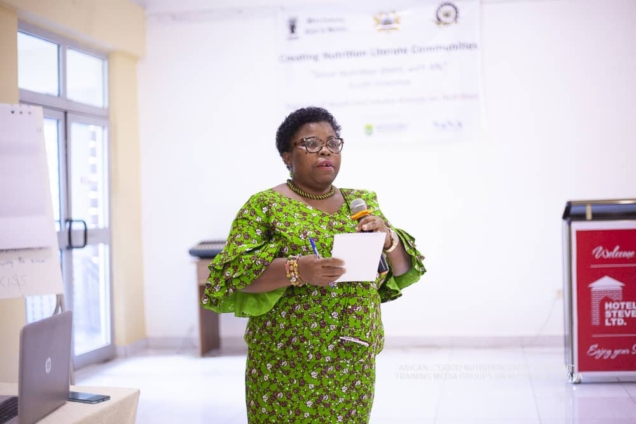The Vice-Chancellor of the University of Health and Allied Sciences (UHAS), Prof. Lydia Aziato, has emphasised the pivotal role of journalists in promoting accurate nutrition information and dispelling misconceptions.
Speaking as the special guest at the opening of a three-day media training workshop on nutrition in Ho, she urged media personnel to become catalysts of change in the field of nutrition.
The workshop, organized by the Africa Catalyzing Action For Nutrition [AfriCAN ] and led by the trustee director, Prof Francis Zotor and an astute journalist dedicated to health advocacy, Dr Charity Binka, aimed to equip journalists with the necessary skills and knowledge to effectively communicate nutrition-related issues to the public.

Addressing the journalists, Prof. Aziato highlighted the significant influence media platforms wield in shaping public perceptions and behaviours regarding nutrition.
"Journalists and media personnel have a crucial role to play in educating the public about nutrition and addressing prevalent misconceptions," stated Professor Aziato. "Their ability to disseminate accurate information can significantly impact public health outcomes."
Emphasising the importance of evidence-based reporting, she urged journalists to collaborate with nutrition experts and leverage scientific research to provide comprehensive coverage of nutrition-related topics.
Professor Aziato also stressed the need for sensitivity and responsibility in reporting, particularly in addressing sensitive issues such as eating disorders and nutritional deficiencies.
"The media has the power to influence dietary choices, food policies, and public health initiatives," Prof. Aziato remarked. "By presenting balanced and factual information, journalists can empower individuals to make informed decisions about their health and well-being."
The workshop featured interactive sessions and presentations by leading nutrition experts, covering a wide range of topics including dietary guidelines, nutritional myths, and emerging trends in nutrition science. Participants were encouraged to utilize storytelling techniques and multimedia platforms to engage diverse audiences and combat misinformation.
In her closing remarks, Prof. Aziato expressed optimism about the potential impact of the workshop in enhancing media coverage of nutrition-related issues. She called upon journalists to uphold journalistic integrity and ethics, emphasizing their role as guardians of public health.
The three-day workshop aims to make the journalists commit to applying their newfound knowledge and skills to raise awareness about nutrition and contribute to positive behavioural change within their communities.
As journalists across the country continue to play a vital role in shaping public discourse, initiatives such as the media training workshop on nutrition serve as catalysts for promoting evidence-based reporting and fostering a culture of health and well-being.
Latest Stories
-
Paris 2024: Opening ceremony showcases grandiose celebration of French culture and diversity
3 hours -
How decline of Indian vultures led to 500,000 human deaths
3 hours -
Paris 2024: Ghana rocks ‘fabulous fugu’ at olympics opening ceremony
4 hours -
Trust Hospital faces financial strain with rising debt levels – Auditor-General’s report
4 hours -
Electrochem lease: Allocate portions of land to Songor people – Resident demand
5 hours -
82 widows receive financial aid from Chayil Foundation
5 hours -
The silent struggles: Female journalists grapple with Ghana’s high cost of living
5 hours -
BoG yet to make any payment to Service Ghana Auto Group
5 hours -
‘Crushed Young’: The Multimedia Group, JL Properties surprise accident victim’s family with fully-furnished apartment
5 hours -
Asante Kotoko needs structure that would outlive any administration – Opoku Nti
6 hours -
JoyNews exposé on Customs officials demanding bribes airs on July 29
6 hours -
JoyNews Impact Maker Awardee ships first consignment of honey from Kwahu Afram Plains
7 hours -
Joint committee under fire over report on salt mining lease granted Electrochem
8 hours -
Life Lounge with Edem Knight-Tay: Don’t be beaten the third time
8 hours -
Pro-NPP group launched to help ‘Break the 8’
8 hours

